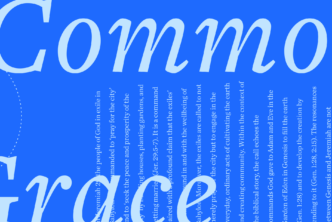That’s not easy to answer. A devotional can be many things. It can be a Bible reading plan. It can be a series of meditations. It can be a liturgical exercise. It can be a daily selection of verses, accompanied by a thoughtful essay.
We all understand a devotional in an experiential sense—who hasn’t sat through some early hours with a cup of coffee and an aging copy of My Utmost for His Highest?—but few can explain in a concise way what a devotional is. We certainly know what a devotional is not.
- It’s not a doctrinal treatise.
- It’s not a Bible commentary.
- It’s not a theological textbook.
A devotional is not designed to change your mind; it’s meant to change your heart.
A clear understanding of God’s Word is very important. Study is essential. Few of us begin our spiritual journey with full knowledge, but as we study Scripture and sit under preaching, our knowledge base grows broader and our understanding grows deeper. Knowledge may be the first thing, but it is not everything. Knowledge must mature into virtue or it will spoil into vanity. Truth you know and do not practice is wasted truth.
And that is what a devotional is for. More than what we ought to think, devotions show us how we ought to feel, so that our impulse decisions are as godly as our thoughtful ones.
It’s no wonder they do not come easily to the more pragmatic among us. We prefer to ignore our feelings, to treat them as vestigial.
Why I started using a devotional
I harbored my own aversion to personal devotions until I became painfully aware of my need for them. I had a Romans 7:15 moment, like I’m sure we all have at some point. Actually, I had several of them in rapid succession.
I realized that study was not quite enough. If I was going to grow into a spiritual father, like John describes in 1 John 2:14, I would need to do something more difficult than suppressing my emotions by force of will. I would need to bring my sinful heart, sometimes kicking and screaming, into a place of submission to the truth I had already learned.
A daily devotional became one of the primary tools that I used to accomplish that.
Thankfully, the free Logos Bible app gave me access to several devotionals, all of them great. These resources are available to you everywhere you go, so even if the devotional life is painfully convicting, at least it can be convenient.
Example devotional entries
Devotionals run the gamut from warm and conversational to more scholarly or poetic, and some even include separate action items or application questions. Here are just a couple of different examples to give you an idea.
Here’s the first part of January 2’s entry from Paul David Tripp’s New Morning Mercies: A Daily Gospel Devotional:
Your rest is not to be found in figuring your life out, but in trusting the One who has it all figured out for your good and his glory.
We were on our way to the local mall with our two young boys when the three-year-old asked out of the blue, “Daddy, if God made everything, did he make light poles?” I had the thought that all parents have, again and again, as they deal with the endless “why” questions that little ones ask: “How do we get from where we are to where we need to be in this conversation?” Or, “Why does he have to ask me ‘why’ questions all the time?”
Human beings have a deep desire to know and understand. We spend much of our daily mental time trying to figure things out. We don’t live by instinct. We don’t leave our lives alone. We are all theologians. We are all philosophers. We are all archaeologists who dig into the mounds of our lives to try to make sense of the civilization that is our story. This God-designed mental motivation is accompanied by wonderful and mysterious analytical gifts. This drive and those gifts set us apart from the rest of creation. They are holy, created by God to draw us to him, so that we can know him and understand ourselves in light of his existence and will.
But sin makes this drive and these gifts dangerous. They tempt us to think that we can find our hearts by figuring it all out. It’s the “If only I could understand this or that, then I’d be secure” way of living. But it never works. 1
And here’s the morning entry for January 2 from Charles Spurgeon’s Morning and Evening: Daily Readings, included for free with the Logos Bible study app (available on mobile app, desktop app, and web):
“Continue in prayer.” —Colossians 4:2
It is interesting to remark how large a portion of Sacred Writ is occupied with the subject of prayer, either in furnishing examples, enforcing precepts, or pronouncing promises. We scarcely open the Bible before we read, “Then began men to call upon the name of the Lord;” and just as we are about to close the volume, the “Amen” of an earnest supplication meets our ear. Instances are plentiful. Here we find a wrestling Jacob—there a Daniel who prayed three times a day—and a David who with all his heart called upon his God. On the mountain we see Elias; in the dungeon Paul and Silas. We have multitudes of commands, and myriads of promises. What does this teach us, but the sacred importance and necessity of prayer? We may be certain that whatever God has made prominent in his Word, he intended to be conspicuous in our lives. If he has said much about prayer, it is because he knows we have much need of it. So deep are our necessities, that until we are in heaven we must not cease to pray. Dost thou want nothing? Then, I fear thou dost not know thy poverty. Hast thou no mercy to ask of God? Then, may the Lord’s mercy show thee thy misery! A prayerless soul is a Christless soul. Prayer is the lisping of the believing infant, the shout of the fighting believer, the requiem of the dying saint falling asleep in Jesus. It is the breath, the watchword, the comfort, the strength, the honour of a Christian. If thou be a child of God, thou wilt seek thy Father’s face, and live in thy Father’s love. Pray that this year thou mayst be holy, humble, zealous, and patient; have closer communion with Christ, and enter oftener into the banqueting-house of his love. Pray that thou mayst be an example and a blessing unto others, and that thou mayst live more to the glory of thy Master. The motto for this year must be, “Continue in prayer.”2
Devotionals versus commentaries
How are devotionals and commentaries different? Most commentaries are more academic than devotionals, and they dive into theological topics, context, biblical languages, and more.
They discuss verses more in depth than devotionals. Compare the devotional examples above with this commentary entry on Genesis 1:1–2 from Matthew Henry’s Concise Commentary (also included free with the Logos Bible study app):
God Creates Heaven and Earth (1:1, 2)
The first verse of the Bible gives us a satisfying and useful account of the origin of the earth and the heavens. The faith of humble Christians understands this better than the fancy of the most learned men. From what we see of heaven and earth, we learn the power of the great Creator. And let our make and place as men, remind us of our duty as Christians, always to keep heaven in our eye, and the earth under our feet. The Son of God, one with the Father, was with him when he made the world; nay, we are often told that the world was made by him, and nothing was made without him. Oh, what high thoughts should there be in our minds, of that great God whom we worship, and of that great Mediator in whose name we pray! And here, at the beginning of the sacred volume, we read of that Divine Spirit, whose work upon the heart of man is so often mentioned in other parts of the Bible. Observe, that at first there was nothing desirable to be seen, for the world was without form, and void; it was confusion, and emptiness. In like manner the work of grace in the soul is a new creation: and in a graceless soul, one that is not born again, there is disorder, confusion, and every evil work: it is empty of all good, for it is without God; it is dark, it is darkness itself: this is our condition by nature, till Almighty grace works a change in us.3
💡 Tip: You can download a free book every month from Logos, and often the free book offered is a commentary.
5 popular devotional books
1. Finding Soul Rest: 40 Days of Connecting with Christ: A Devotional
2. Walking with God Day by Day: 365 Daily Devotional Selections
3. The Promised One: Seeing Jesus in Genesis
4. Exploring Grace Together: 40 Devotionals for the Family
5. For the Love of God
Collection
💡 Tip: You can download a free book every month from Faithlife Ebooks, and sometimes that free book happens to be a devotional.
How to get the most benefit from devotional readings
Reading devotionals is a great way to look at concepts or Scriptural application with fresh eyes. Devotionals are helpful if you only have time for a quick read, but adding a few more steps makes them even more helpful.
1. Pray first.
Even a simple prayer like “Lord, I want to follow you and grow closer to you. Please help me see the truth you want me to see today” orients your focus and asks for the Spirit’s leading.
2. Read the accompanying Scripture.
Reading the devotional entry but not the accompanying Scripture is tempting, especially when you’re in a hurry. If you use Logos, you can hover over the passage, and it will pop up for you to read. Or you can open to the passage in your Bible with a click or tap.
3. Stay consistent.
Like with Bible reading, it’s easy to be consistent for a few days or weeks and then drop off. With Logos, you can create a reading plan to help. Even if you don’t create a reading plan, Logos will automatically open the devotional to where you left off (whether you’re opening Logos on the same device or switching between your phone, tablet, etc.).
4. Take notes.
When you think of an application, a related verse, or a personal story that illustrates the day’s reading, don’t let it slip away—add a note so you never lose that thought. With Logos, you can add a note by right-clicking on desktop or tapping and holding on the mobile app, then selecting Note.
💡 Tip: To tie a note to a passage, go to the passage first before you make the note (rather than making the note directly in your devotional).
5. Write out a verse.
Choose a verse from your devotional reading and write it out by hand. To take this a step further, write the verse somewhere handy and refer to it throughout the day.
***
Get started with free devotionals today
Devotionals included in the free Logos Bible app
- Brand New: A 40-Day Guide to Life in Christ
- Connect the Testaments: A 365-Day Devotional with Reading Plan
- DIY Bible Study, 4 vols.
- Morning and Evening: Daily Readings
- The Pilgrim’s Progress
***








